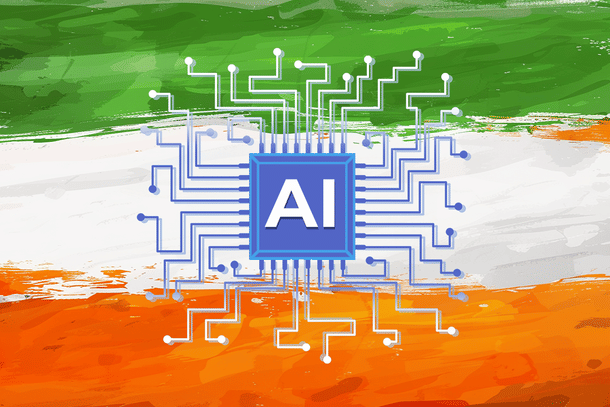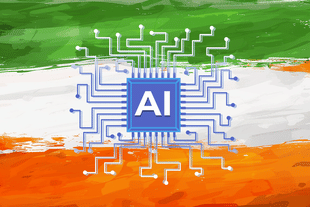Technology
India To Become AI Use-Case Capital Of The World? No, Thanks, Not At The Cost Of Fundamental Innovation
Karan Kamble
May 21, 2024, 01:05 PM | Updated 01:05 PM IST
Save & read from anywhere!
Bookmark stories for easy access on any device or the Swarajya app.


Less than a year ago, Rajan Anandan, a managing director at the Indian venture capital firm Peak XV Partners, posed a question to OpenAI’s chief executive officer, Sam Altman. OpenAI is the company behind the viral artificial intelligence (AI) chatbot ChatGPT.
“If you want to build foundational models, how should we think about that? Where is it that a team from India, you know, three super-smart engineers with not a 100 million but let’s say 10 million, could build something truly substantial?” Anandan asked.
“Look, the way this works is, we’re going to tell you it’s totally hopeless to compete with us on training foundational models, you shouldn’t try, and it’s your job to try anyway, and I believe both of those things,” Altman quipped back to erupting laughter.
Speaking just days ago at an AI-focused event, Anandan appeared to have taken Altman’s advice.
“I don’t know whether I would ask Sam Altman any more questions. I am much more interested in asking Nandan (Nilekani) how do we go 10x faster in making India the AI use-case capital of the world,” he told a journalist in a conversation about building world-class AI startups in India.
The reference to Nilekani came from the vision presented by the Infosys co-founder just over a week ago that India could become the AI use-case capital of the world. "The Indian path in AI is different. We are not in the arms race to build the next LLM (large language model). Let people with capital, let people who want to pedal chips do all that stuff... We are here to make a difference, and our aim is to give this technology in the hands of people," the architect of Aadhaar said at an event hosted by People+AI in Bengaluru.
Back to Anandan: “I think India’s game is really in the application layer,” he said, echoing Nilekani’s views.
Further, he said that while the primary focus of (San Francisco) Bay Area AI is to eventually achieve artificial general intelligence (AGI), which is AI that can rival the capabilities of a human being, “the goal that we have, I think, as an ecosystem in India… we want to uplevel humans, we don’t want to build machines.”
Predicating his entire argument on the fact that India’s population is enormous and each one can be served better by AI, he said, “If you take this lens around how do you build population-scale solutions that just make 1.4 billion Indians live better, more successful, you think differently,” adding that India would “leverage technology from whoever builds it.”
“Look, OpenAI is a phenomenal company and they will have GPT 5 and GPT 6 and it’ll be extraordinary, but I’d love to figure out how to make every farmer in India have 3x the yield so that they can live a better life,” Anandan said — a comment that drew consternation on social media.
While Anandan and Nilekani make a strong case for India to focus on building AI applications that serve its many people, shutting the door down, or even keeping it ajar, on core innovation, such as building foundational models that power advanced generative AI tools like ChatGPT, Claude, and Gemini, and necessary compute infrastructure like data centres, is placing an unnecessary artificial restriction upon yourself, and likely a very costly one at that.
Not only does it severely restrict the realisation of India’s potential in this critical space and stymy any indigenous AI research effort — and that too at a time when AI, at least of the generative kind, is still in its infancy — it also goes against the spirit of “Aatmanirbhar Bharat (Self-Reliant India)” propounded by Prime Minister Narendra Modi.
That India has a billion-big population doesn’t only reflect the enormous needs of its people, but also the country’s tremendous scope and potential to deliver new, original, and path-breaking research.
After his response to Anandan about the ‘hopelessness’ of competing with OpenAI, Altman said in an X post that the question posed to him was the wrong one, “The right question is what a startup can do that’s never been done before, that will contribute a new thing to the world. i have no doubt indian startups can and will do that! and no one but the builders can answer that question.”
To “contribute a new thing to the world,” India would be better off innovating all across the AI chain, from research and development (R&D) to the end product in the hands of a consumer or business, or risk building dependency on technology giants in the West and elsewhere in perhaps the most crucial segment — laying the groundwork for new technology.
Strangely, some industry experts suggested at the AI media event where Anandan spoke that India lacked the capacity and talent to build foundational AI models from the ground up. If that is the case (which it is not, at least in terms of talent), the university system and industry need to introspect about how they are clipping the wings of Indian talent. Because a Prafulla Dhariwal from Pune can move to the United States (US) and build state-of-the-art models like OpenAI’s latest GPT-4o.
“GPT-4o would not have happened without the vision, talent, conviction, and determination of @prafdhar (Dhariwal) over a long period of time. that (along with the work of many others) led to what I hope will turn out to be a revolution in how we use computers,” Altman said in an X post.
Given a conducive environment for innovation, which includes a daring vision, generous time, and unimpeded backing, Indian talent would similarly return revolutionary work that changes the world.
In any case, it is no secret how much of an impact AI is expected to have on the world, and carries profound implications in areas like economy, geopolitics, and national security. The current global climate is evidence that a country can be cut off from the needs of its people and industry as if by the mere flip of a switch. Consider the Russia-Ukraine conflict or the US-China trade war as examples.
Finally, this isn’t a case of either-or for India — either build foundational models for AI or build applications using existing models. Both are up for grabs at the moment, and India must seize the opportunity across the entire AI ecosystem without second-guessing itself.
Karan Kamble writes on science and technology. He occasionally wears the hat of a video anchor for Swarajya's online video programmes.





